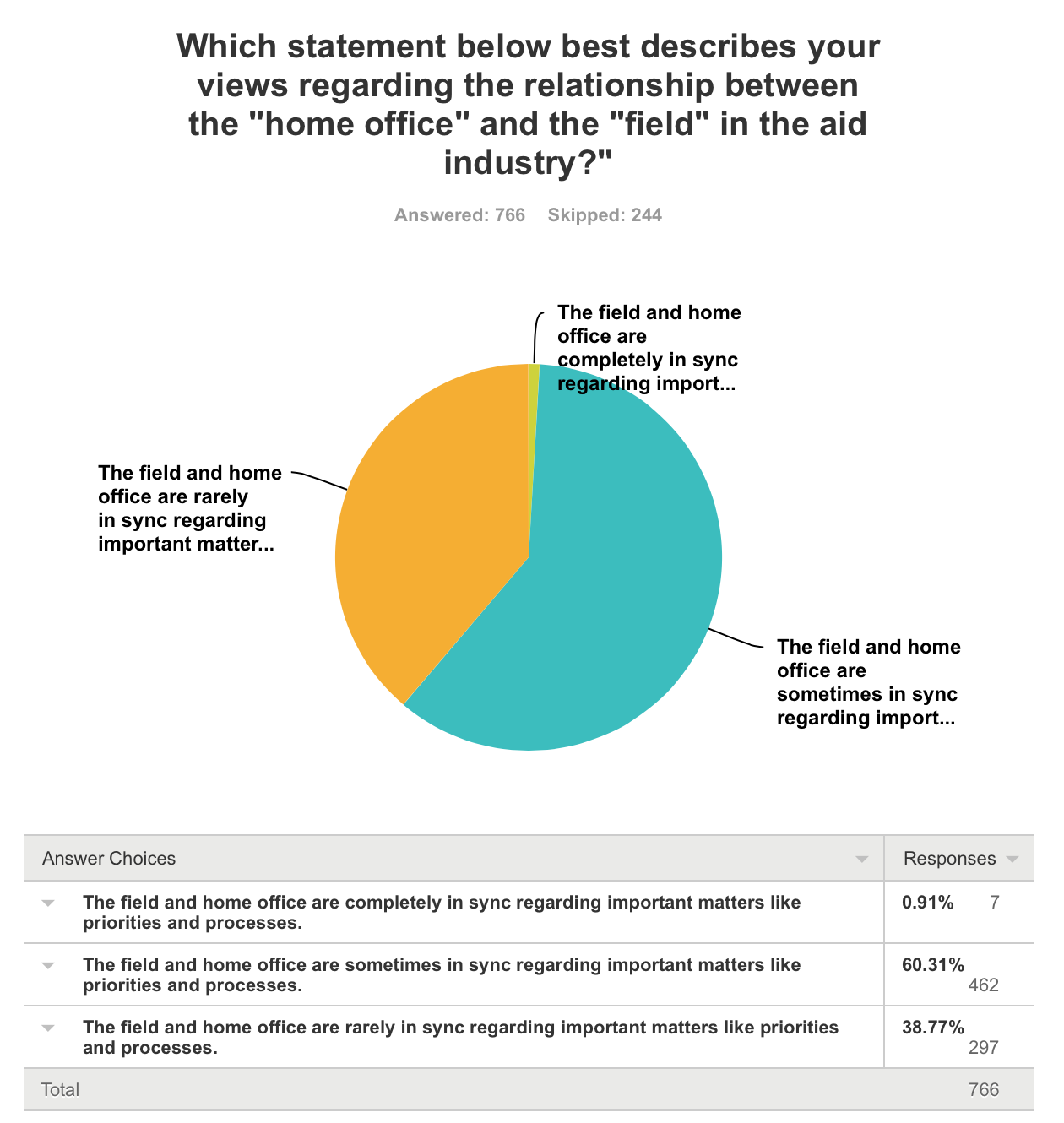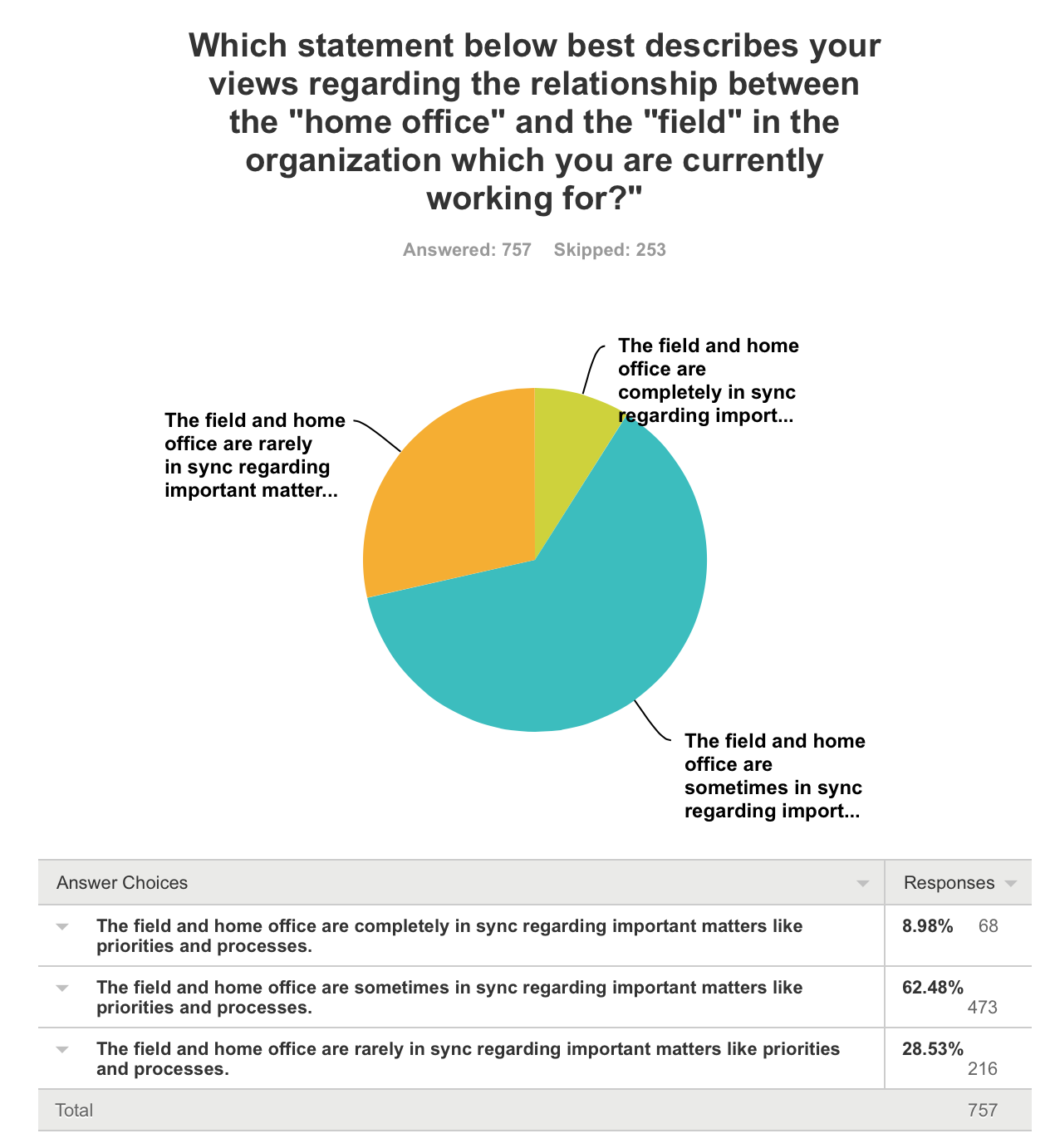And now more on the survey results…
The relationship between the “home office” and the “field”
“Well, HQ is HQ and the people there are just different. Not necessarily ill-intentioned or stupid (although it seems that way at times), just different.” –26-30 yo female expat aid worker
Yes, we are aware of the increasing blurring between what can be called “home office” and the “field” and also that many aid workers are neither and both at the same time. That said, here are some interesting results from our survey questions that simply asked for an overall perspective. Below we look at both the quantitative and qualitative results from three questions, Q50-52.
Q50 results below indicate a pretty negative view of the relationship. Our results indicated a microscopic 1% indicating that “The field and the home office are completely in sync regarding important matters like priorities and processes.” A hefty 40% indicated these two realms were “rarely in sync.” Why is this? One broad-strokes answer is the truism that as bureaucracies get larger -and a good percentage of our respondents are from “big box” organizations- communication and coordination are structurally more complicated and, hence compromised.
Here is one narrative example to illustrate:
“Generally its all down to regular communication and putting faces to the names. The home office sometimes push “top-down” priorities that they want to see be coherent across all active programme-countries, and sometimes need to step back from their perfect plan and accept that it can’t be copy/pasted across different sites. On the other hand, I have seen the field staff exaggerate how ‘badly understood’ they are by the home office (sometimes to excuse a lack of progress…its so easy to blame things that the home office ‘just don’t understand’ about the conditions. But sometimes, it really is just due to bad field-management!..that makes it hard for the home office to know the difference).” -26-30 yo female expat aid worker
This next respondent nails my point: “This [lack of sync] applies to all organisations with HQ and regional offices, not just aid work.” –56-60 yo female consultant
So, here is the quantitative data from Q50 and Q51:
Q51 results are interesting in that it gets a bit more personal, our question asking about the current organization of the respondent. The “rarely” response, like Q50 above is still low at a paltry 9%….less than one in 10. The “rarely” response is still high, but now that the respondents are talking about their own organization the number is 29% (as compared to the 39% reported about the relationship in general in the industry.
Here are some specific narrative responses that flesh out the numbers above.
First these two from what I would call a reality-based perspective:
- “Much of the decision making is done in the field and since the vast majority of employees are very competent, this works well. The biggest source of feeling ‘out of sync’ is in regard to human resources- both being able to staff the field adequately and taking care of people when they leave.” 31-35 yo female expat aid worker
- “Time zones, language/cultural barriers, personality differences, technological skill- these are just some of the challenges to attaining complete alignment between the 2 types of offices.” 18-25 female working in HQ
You can sense the frustration in these next three comments:
- “We are regularly left out of home office conference calls and group emails that include all other country offices in the region. I don’t know whether the home office forgets to include us or is being passive aggressive. Either way, we are a mess. The leadership of my country office criticizes our regional office and our HQ/home office regularly. It seems like the feelings are mutual.” -18-25yo female expat worker employed within the UN system
- “Put simply, there is an immense disconnect between reality and policy. Also, I often feel or am made to feel inferior by the hierarchy in which final decisions must go through HQ and are decided by people who are totally removed from the contexts. To make decisions, you must spent endless hours justifying a decision before you can make it. Can’t imagine what national staff must feel like (hence the indifference, I suppose).” –36-40 yo male working in HQ
- “Damn emails. The world was beautiful before emails and the immediate responses needed by someone at HQ. That’s why I like to work in the field where I can decide that the internet ‘didn’t work for several days’.” –56-60 yo male expat aid worker
These next two are particularly insightful and speak to issues that most in the sector will recognize:
- “In my experience, the relationship between the field and home office is good when there is a close dialogue and working relationship between the Country Director and the Regional Director that the CD reports to. This being said with increasingly multiple reporting or accountability lines, I am not sure that the above really applies… It’s always a difficult balance, especially in high profile emergencies, between the field having space and support to make decisions and the home office feeling that its interests are being met.” –46-50 yo female HQ based
- “This is the result of having very high turnover at all positions including high level management ones. Some people came with centralization ideals, others with decentralization. Result: we find ourselves with two layers that develop themselves regardless of the other. Processes, procedures, and responsibilities are often blurry. “Home office” works 4.5 days a week from 8 to 4pm, “field” is 6.5 days a week from 7 to 8pm. “Home office” is gangrened with political and career building moves. Often, the field ends up flipping the finger and taking over everything. “Home office” then try to finds itself a justification to exist in terms of informal support line. Once in a while they get hormone rush, and they go top-down very strongly. At field level, you then choose your battles. Field has a strong feeling that they don’t need the “home office” to operate. The “home office” thinks that they are the captain of the boat. The whole thing could be a giant case study to analyse for a final exam in management.” –26-30 yo male expat aid worker
Indeed, this is a problem of organizational management, but though we can react to communication and sync issues as they arise, the bigger picture is that the problems identified above are inherent whenever organizational size increases. The truism in the business sector that “big fish eat little fish” -and hence that there is a force toward the domination by bigger business entities- is somewhat also true in the aid sector, if only because the economy of scale. That and, well, Max Weber was right in pointing out the bureaucratization inevitably leads toward quantification and depersonalization and to the overall phenomena of organizations acting in the interests of self-survival as an entity and hence straying from their original mission.
The point made in the last respondent’s comment that there is “very high turnover at all positions including high level management ones” cannot be ignoreed as a major factor impacting the overall efficiency level of aid organizations. Two obvious impacts include (1) training new personal takes time, energy and both human and material resources and this constant drain inevitably impacts overall system performance and (2) institutional memory is constantly being lost as personnel come and go, hence the sense that some organizations are always recreating the wheel. To be clear, these issues are not unique to the aid industry.
To go back to the sociologist Max Weber for a moment, he invokes the image of the stahlhartes Gehäuse or ‘iron cage’ in his ruminations about the inexorable rise of bureaucratization in the modern world. He would look at the aid world and say ‘it is what it is’ (or some German phrase meaning as much). Big bureaucracies will always be necessary and indeed the only way forward for social organization but they will always be inherently hampered by their size: the bigger they get the less efficient they become…for many of the reasons touched on above, and more.
When I talk about the “iron cage of rationality” with my students I trot out an aphorism I coined may years ago to explain one important dimension of the problem of bureaucratization, this one especially relevant in the aid world when examining the need to “show results.” Merging a thought by Blaise Pascal “Not being able to make what is just strong, one made what is strong, just” with my understanding of Weber I came up with “Not being able to measure that which is real, we tend to make that which is measurable, real.” Where was the drunk looking for his watch? Under the lamp post. Why? Because that is where the light was best. Hence we forever spin our wheels, constantly inside the iron cage.
Sigh.
So I’ll end not with comments from our respondents but from my muse Max Weber. To wit,
“When those subject to bureaucratic control seek to escape the influence of existing bureaucratic apparatus, this is normally possible only by creating an organization of their own which is equally subject to the process of bureaucratization.”
Yes, MONGO’s do seem like a good idea at the time….
And, finally, on a realistic (?) and melancholy note, also from Weber.
“Not summer’s bloom lies ahead of us, but rather a polar night of icy darkness and hardness, no matter which group may triumph externally now.”
As always, please contact me with questions or comments or add your thoughts for discussion over at Aid Source forum which accompanies this project.




 Follow
Follow